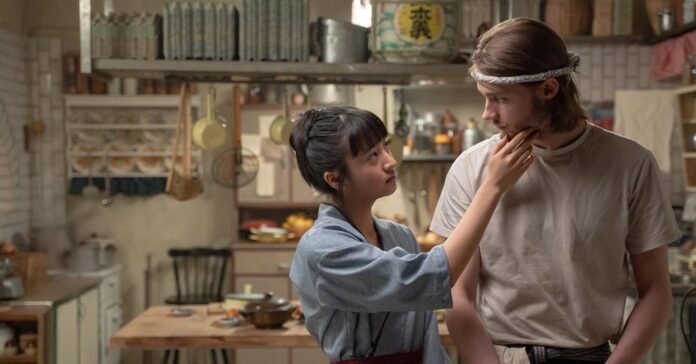Dir: Baltasar Kormákur. Iceland/UK. 2024 120mins
A dementia prognosis within the early days of the Covid-19 pandemic is the catalyst for taciturn Icelandic restaurateur Kristofer (Egill Ólafsson) to shut his Reykjavik restaurant and journey to London within the hopes of reuniting with a Japanese girl he liked and misplaced there 50 years beforehand. This may occasionally sound, on paper, like the idea for a mawkish tearjerker — and there are moments of excessive emotion — however director Baltasar Kormákur and his actors err on the facet of restraint, delivering a balanced, absorbing human drama.
Balanced, absorbing human drama
Kormákur, recognized for motion motion pictures like Everest and Adrift, returns right here to the character-driven roots of his 2000 debut 101 Rekyavik. Launched within the US on July 12 and the UK on August 30 and buoyed by constructive evaluations, Contact may appeal to audiences on the lookout for extra grownup fare than, say, Despicable Me 4 (which opens on the identical date within the US). It ought to finally even have an extended tail on streaming.
In a brisk opening sequence, we see septuagenarian Kristofer obtain the information that he’s within the early phases of dementia. Kristofer, who lives alone in Reykjavik following the loss of life of his spouse some years in the past, takes on this data in a usually stoic method. Icelandic actor Ólafsson, who himself lives with Parkinson’s, brings a quiet gravitas to the function. Kristofer’s resolution to go away his house and journey to London, within the hopes of monitoring down the Japanese girl he fell in love with in 1969, could also be impulsive — notably provided that it’s 2020, with pandemic lockdown looming and borders closing — but it surely by no means comes throughout as foolhardy. This isn’t a person determined for one final fling, however somebody looking for closure earlier than it’s too late.
Shortly, the screenplay by Kormákur and Ólafur Jóhann Ólafsson (who wrote the supply novel) throws us right into a flashback of Kristofer (right here performed by Pálmi Kormákur, the director’s son) as a charismatic, idealistic scholar at London College Of Economics. Rising uninterested in his ‘bourgeois’ research, that are at odds together with his Marxist ideologies, he takes a job as a pot washer in Japanese restaurant Nippon — attracted as a lot by Miko (mannequin Kōki Kimura), the beautiful daughter of resturant proprietor Takahashi-san (Masahiro Motoki), as he’s by the need to earn an trustworthy wage.
These prolonged flashbacks are shot by Bergsteinn Björgúlfsson in a softer tone with occasional moments of lens flare, which emulate the hazy heat of reminiscences, the sepia tint of nostalgia. Set to a peppy, immediately recognisable interval soundtrack (John Lennon, The Zombies), these are additionally bustling with life and noise — a stark distinction to the sequences set throughout 2020, the place Kristofer wanders empty streets and is the one visitor in his London lodge. Human connection turns into much more unattainable, which makes an prolonged sequence by which Kristofer befriends a fellow widower in a Japanese sake bar all of the extra poignant.
There are additionally shorter flashbacks to moments of Kristofer’s time in Iceland together with his spouse. Editor Sigurður Eyþórsson deftly weaves these all through the narrative in order that the the totally different timelines work collectively to create a full image of a life. That’s helped enormously by Högni Egilsson’s light rating, which acts as connective tissue, and the standard of the performances. It’s simple to see how the idealistic, poetic younger Kristofer would have grown into the extra pragmatic older man, and the way his experiences with Miko have formed his complete life. The chemistry between the 2 kids is palpable, given additional cost by the truth that they have to hold their burgeoning relationship secret from Takahashi-san, who wields authoritarian management over Miko’s private life.
And that is the place the story widens. The household fled Hiroshima in 1945, after which, after the loss of life of Miko’s mom, moved from Tokyo to London, making an attempt to flee the stigma that hangs over Miko, whose mom was pregnant along with her on the time the atomic bomb was dropped on their house metropolis. That also casts a shadow over her life in London, regardless of her defiant perspective and succession of Mary Quant mini skirts, and in the end drives a wedge between her and Kristofer.
The vast majority of the movie has a low-key urgency, occasions pushed by the ticking clock of Kristofer’s prognosis and the tightening grip of the pandemic, all constructing to the purpose the place Kristofer tracks down Miko (now performed by the movie’s casting director Yoko Narahashi), residing again in Hiroshima. But, as their story comes full circle and long-held feelings lastly come to the fore, there’s a way of stillness, of peace — and, regardless of uncertainties previous and current — of latest beginnings.
Manufacturing corporations: RVK Studios
Worldwide distribution: Focus Options
Producers: Mike Goodridge, Agnes Johanson
Screenplay: Ólafur Jóhann Ólafsson, Baltasar Kormákur
Cinematography: Bergsteinn Björgúlfsson
Manufacturing design: Sunneva Ása Weisshappel
Enhancing: Sigurður Eyþórsson
Music: Högni Egilsson
Primary solid: Egill Ólafsson, Pálmi Kormákur, Kōki Kimura, Yoko Narahashi, Meg Kubota
